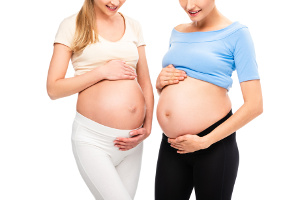Vitamin D during pregnancy protects the baby against eczema
 Atopic dermatitis (eczema) is a widespread problem and a huge burden to both the child and its parents. According to a new study that is published in British Journal of Dermatology, high-dosed vitamin D supplementation of the mother during her pregnancy lowers the child’s risk of developing eczema within its first year of life. The pregnant women in the study got 25 micrograms of vitamin D daily, which is more than twice the amount that is currently recommended to expecting mothers. Health authorities already recommend all-year vitamin D supplementation to children up to the age of four years, so it appears that this measure can offer additional protection against eczema.
Atopic dermatitis (eczema) is a widespread problem and a huge burden to both the child and its parents. According to a new study that is published in British Journal of Dermatology, high-dosed vitamin D supplementation of the mother during her pregnancy lowers the child’s risk of developing eczema within its first year of life. The pregnant women in the study got 25 micrograms of vitamin D daily, which is more than twice the amount that is currently recommended to expecting mothers. Health authorities already recommend all-year vitamin D supplementation to children up to the age of four years, so it appears that this measure can offer additional protection against eczema.
Around one in six children aged one to five years suffers from atopic dermatitis, also known as eczema. The condition is a chronic inflammatory condition that causes dry, red, and itchy sin. Infants typically develop oozy blisters on their cheeks and hands. They may also have eczema in the diaper area, or on their arms and legs. Local skin infections can occur due to the constant itching. It has been seen that people with atopic dermatitis are more prone to psychological disorders such as ADHD and depression.
Eczema affects more and more children and there are certain hereditary factors involved. It also looks as if vitamin D deficiency may play a major role. A team of British scientists therefore wanted to look closer at this.
Vitamin D during pregnancy and breastfeeding protects the child against eczema
The study was conducted at the University of Southampton and is the first controlled study to look at the use of high-dosed vitamin D supplementation in pregnancy to see if it can lower the child’s risk of atopic dermatitis. The scientists also wanted to see if breastfeeding had any impact on the problem. More than 700 pregnant women took part in the study. Half of them got 25 micrograms of vitamin D daily from the 14th week pregnancy until delivery. The other half got matching placebo during the same period. The vitamin D dose used in the study is way beyond the official guidelines for vitamin D during pregnancy.
The study showed that high-dosed vitamin D supplementation lowers the baby’s risk of developing eczema during its first year of life. It is already known that vitamin D has anti-inflammatory properties and affects certain skin proteins. This study confirmed that vitamin D during pregnancy affects the baby’s immune defense, thereby lowering the risk of eczema. The effect was better in mothers who breastfed their babies, which is most likely because of the high concentration of vitamin D in breastmilk. It is also important to mention that vitamin D is important for developing healthy bones in the child.
The scientists behind the study recommend that pregnant women are routinely supplemented with vitamin D. Supplementation with vitamin D during pregnancy, however, did not affect eczema risk in children older than two years. For that reason, it is important that small children get extra vitamin D to continue the protective effect of the nutrient and its positive influence on other functions.
According to the Danish health authorities, children up to four years of age should get 10 micrograms of vitamin D daily all year round. For children older than that, vitamin D supplements are only recommended during the winter period, provided the child has been exposed to a sufficient amount of sunlight during the summer period. If this is not the case, all-year supplementation is advised.
The European Food Safety Authority (EFSA) has established a safe upper intake level for vitamin D that is 25 micrograms for infants, 50 micrograms for children aged 1-10 years, and 100 micrograms for older children and adults (including pregnant and breastfeeding women).
- Most cells in the body have vitamin D receptors (VDR)
- Vitamin D is of key importance to the unborn child’s bones, teeth, immune defense, brain, nervous system, and other functions
- The fetus depends entirely on vitamin D from its mother. The nutrient is transferred via the placenta
- If pregnant women lack vitamin D, it increases their children’s risk of developing atopic dermatitis and neurological disorders such as ADHD
- Pregnant women are advised to take high-dosed vitamin D all year round
- Children up to the age of four years are advised to get vitamin D all year round
References:
Sarah El-Heis et al. Maternal antenatal vitamin D supplementation and offspring risk of atopic eczema in the first 4 years of life: evidence from a randomised controlled trial. British Journal of Dermatology. 2022
University of Southampton. Taking Vitamin D during pregnancy could lower the risk of eczema in babies. ScienceDaily. July 5, 2022
Jose Luis Mansur et al. Vitamin D: Before, during and after Pregnancy: Effect on Neonates and Children. Nutrients. 2022
Claire Simner et al. Placental uptake and metabolism of 25(OH) vitamin D determine its activity within the fetoplacental unit. eLife 2022
Minna Sucksdorff et al. Maternal Vitamin D Levels and the Risk of Offspring Attention-Deficit/Hyperactivity Disorder. Journal of the American Academy of Child & Adolescent Psychiatry. 2019
Search for more information...
- Created on .








